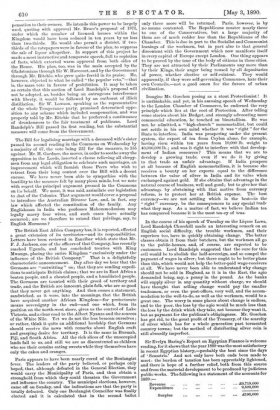Imagine Mr. Goschen posing as a stout Protectionist ! It
is unthinkable, and yet, in his amusing speech of Wednesday to the London Chamber of Commerce, he endorsed the very principle which lies at the root of Protection. After telling some stories about his Budget, and strongly advocating more commercial education, he touched on bimetallism. He was not, he admitted, a " high-church " monometallist, but could not settle in his own mind whether it was " right " for the State to interfere. India was prospering under the present system, the export of tea from Ceylon alone, for example, having risen within ten years from 10,000 lb. weight to 40,000,000 lb. ; and was it right to interfere with that develop- ment of Indian resources ? This means that we are to develop a growing trade, even if we do it by giving to that trade an unfair advantage. If India prospers at all because of English monometallism, it is because she receives a bounty on her exports equal to the difference between the value of silver in India and its value when exchanged against gold. If she obtains that advantage in the natural course of business, well and good; but to give her that advantage by abstaining with that motive from currency reform, is to protect her at British expense. The best currency—we are not settling which is the best=is the " right" currency, be the consequences to any special trade what they may. As a matter of fact, we believe Indian tea has conquered because it is the most tea-ey of teas.






































 Previous page
Previous page